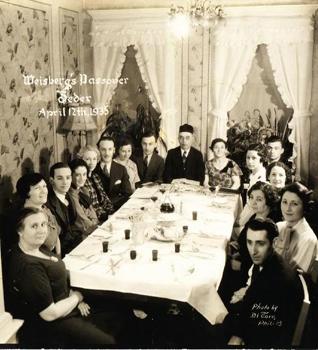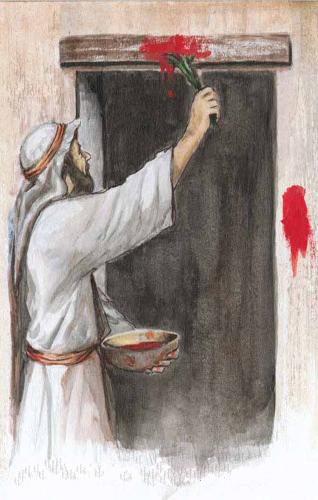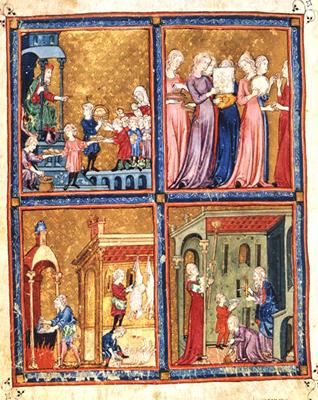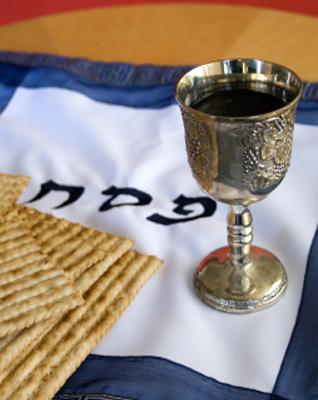Columnists
Jewish Passover: Making It Personal
by YVETTE ALT MILLER
The Jewish Passover will start on Tuesday, the 30th of March, 2010, and will continue for 7 days until Monday, the 5th of April.
The following story, consisting of personal ruminations by a Jewish-American, has a lot to teach us, as we too approach the annual observance of a seminal anniversary: Vaisakhi!
How can we identify with the Jewish slaves today?
"In every generation each individual is bound to regard himself as if he had gone personally forth from Egypt." - [The Passover Haggadah]
At Passover Seders each year, we recite the Haggadah's timeless instructions to regard ourselves as having personally lived through the events of the Exodus. The Seder itself is designed to help us envision our participation in the story. We dip parsley into saltwater to remember the tears we shed in Egypt, and we munch on spicy, bitter horseradish in an attempt to replicate a little of the misery we experienced as slaves.
But how far can saltwater and horseradish really take us? For most of my life, when I pictured ancient Egypt, I thought of the 1956 epic film, The Ten Commandments. The sets were opulent, and I loved Anne Baxter's gorgeous robes and headdresses as she played Nefertiti, queen of Egypt.
After viewing ancient Egyptian artifacts, I don't think I'll ever think of ancient Egypt the same way again.
Years later, when I caught the traveling King Tut exhibit, my preconceptions of ancient Egypt were confirmed. The craftsmanship of the artifacts was breathtaking. I knew that ancient Egypt wasn't good for my ancestors, but it was hard to picture it as something really unpleasant. To the contrary, it seemed fascinating, advanced and beautiful.
That changed recently, after my family and I spent an eye-opening afternoon viewing ancient Egyptian artifacts at Chicago's Field Museum of Natural History. I don't think I'll ever think of ancient Egypt the same way again.
"And the Egyptians made the children of Israel to serve with rigor. And they made their lives bitter with hard service, in mortar and brick." - [Exodus 1:13]
The first artifact we beheld was a magnificent tomb, transported from Egypt. We were able to see the provisions that had been packed for the tomb's wealthy occupant: foods, moneys, cosmetics ... and pictures of the hundreds of household slaves who had been massacred, so that their souls could accompany their master on his voyage to the afterlife. Each time a nobleman died, their household of slaves was murdered en masse in this way.
As I peered at the faces painted on those walls thousands of years ago, I tried to imagine that they were each somebody's son or daughter, somebody's father or mother. Tears began to well in my eyes.
Next in the exhibit we saw a fascinating array of everyday items: pots for food, scales and weights for measuring transactions. And then we learned of the horrific punishments meted out to merchants and slaves who were thought guilty of shortchanging their masters: gruesome tortures, maimings, public punishments such as beatings, impaling, the gouging out of eyes ... The list went on. The upper-classes were protected, but lower-class people in ancient Egypt were considered fair game for the most terrible treatments imaginable.
My family and I were getting a little discomforted, but we continued on with our visit. We viewed examples of ancient Egyptian dress. While the more prosperous wore long, flowing robes of white, the clothing shrunk the lower you went on the social scale. Lower-class workers and slaves went completely naked, battling the hot Egyptian sun, as well as snakes and scorpions.
Finally, we saw pictures of public fights. I'd always associated gladiatorial displays with ancient Rome, but hundreds of years earlier, in ancient Egypt, slaves were forced to fight wild beasts such as lions, in what was, apparently, a very popular spectacle.
As I wandered out of the Field Museum, completely shaken by the gruesome displays I had seen, I wondered: How can I, who live in comfortable, 21st century America, possibly imagine what it was like to be a slave, the lowest of the low, in a cruel, sadistic society such as ancient Egypt? Afraid that at any moment my work would not be considered enough, that at any moment I or those I loved could be arbitrarily tortured, or beaten or killed?
"And it came to pass in those days, when Moses was grown up, that he went out unto his brethren, and looked on their burdens, and he saw an Egyptian smiting a Hebrew, one of his brethren. [Moses] looked this way and that way, and when he saw that there was no man, he smote the Egyptian, and hid him in the sand." - [Exodus 2:11-12]
The Torah provides us with a remarkable example of how we can overcome the distance between us and our ancient ancestors who were slaves in Egypt: Moses.
We all know his story: Seeking to destroy the Jewish people once and for all, Pharaoh decreed that all Jewish baby boys be drowned at birth. The Torah explains, however, that the Jewish midwives defied Pharaoh, and secretly saved and hid the Jewish babies. One of these very midwives, Yocheved, gave birth to a baby son during this terrible time. She kept his birth a secret, placed him in a basket of reeds, and set him afloat in the Nile rather than let him be killed by Egyptian soldiers. Pharaoh's daughter Batya found the basket, rescued the baby inside, named him Moses, and raised him as her own son.
Moses thus grew up in the confines of the palace, enjoying all the comforts and opulence of life in the highest caste of Egyptian society. (Think of those King Tut treasures!)
Yet, the Torah teaches, Yocheved was fortuitously hired as the wet-nurse for baby Moses. Throughout his early years, Moses' own mother was thus able to teach him, whispering to him the truth that he was a Jew.
The message profoundly shaped Moses. Years later, when this strapping young man, the adopted grandson of the Pharaoh, looked at the lowly Hebrew slaves, he saw them not as vermin, but as his "brothers."
How can we today achieve this same level of identification with our Jewish ancestors in slavery?
So much poverty - physical and spiritual - afflicts our community today. How many of us can truly say we heed Moses' example and call out "brother" and "sister"?
In my own city of Chicago, for example, 20% of Jews are poor, as are a shocking 24% of Israelis today. Many volunteers do step forward to address this dire need in our communities; their examples can inspire us.
Spiritually, our community today is even more starving. Jews today thirst for connections to G-d and to our Jewish heritage, yet the path to these riches so often eludes us. How many of us truly have the level of Jewish knowledge that we would like? Yet, here too, we find inspiring rabbis and teachers who labor to spread Jewish knowledge.
This Passover, amid all the singing, the visiting, and the eating of Passover, I will remember the cruelties and degradation slavery meant for our ancestors. I will remember how Moses was able to look at a fellow Jew, a slave, and say "my brother."
And I will remember that each of those Jews held true to their Jewish faith, so that I, too, could one day sit around a table of opulence and recall those days of slavery in Egypt.
[Courtest: Aish.com]
March 24, 2010
Conversation about this article
1: Devinder (Delhi, India), March 24, 2010, 12:29 PM.
As a youngster, I did view epics like 'The Ten Commandmants', 'Ben Hur' and 'The Bible" as also the famous 'Cleopatra'. Indeed, the opulence of the sets projected what has been often confirmed by research channels, the glory of Egypt and the Mediterranean. The suffering at that time has been recorded for continued reference, in fact this has been the story of mankind east, west, north or south ... only the names, clans, nationality kept changing. Even today, those that have the power (individuals and nations) scream untruths and easily make it appear as true. Every religion acknowledges there is nothing that one would take with him when he leaves the world, yet the race and repression is continuous and camouflaged for the commoner to believe in what is presented. Only if mankind understands and practices truth will there be any deliverance from this suffering. Today, those in the upper circles of our society practice to retain or up their status and would ensure that morals are only for others. Those below them must practice these and pass them on to their future generations to enable the dominant ones to retain their position. This is true for business empires, nations and societies. The rule book has not changed, only the practice has become more sophisticated and unrecognizable. Mankind is its own enemy, and is no better than animals. It's a civilized but uncivilized world, where one preaches but shies away from practicing. None would accept the ultimate truth that born out of dust, to dust we must return. If we remember the past, it's only for that small moment and we get drowned in the stream of civilization. Lessons learned from history should not be lost.
2: Sangat Singh (Kuala Lumpur, Malaysia ), April 05, 2010, 1:00 AM.
I had a chance to visit Jerusalem in 1997 and wanted to write about the ancient land. But somehow I missed the deadline and since, the articles are dated, I thought I had missed its shelf life. But, just now I found a nugget on the net that provides the twist and must be shared. In Florida, an atheist created a case against the upcoming Easter and Passover holy days. He hired an attorney to bring a discrimination case against Christians and Jews and observances of their holy days. The argument was that it was unfair that atheists had no such recognized days. The case was brought before a judge. After listening to the passionate presentation by the lawyer, the judge banged his gavel declaring, "Case dismissed!" The lawyer immediately stood up, objecting to the ruling saying, "Your Honor, how can you possibly dismiss this case? The Christians have Christmas, Easter and others. The Jews have Passover, Yom Kippur and Hanukkah, yet my client and all other atheists have no such holidays." The judge leaned forward in his chair saying, "But you do. Your client, counsel, is woefully ignorant." The lawyer said, "Your Honor, we are unaware of any special observance or holiday for atheists." The judge said, "The calendar says April 1st is April Fools Day. Psalm 14:1 states, 'The fool says in his heart, there is no God.' Thus, it is the opinion of this court, that, if your client says there is no God, then he is a fool. Therefore, April 1st is his day. Court is adjourned." You gotta love a judge that knows his scripture!






